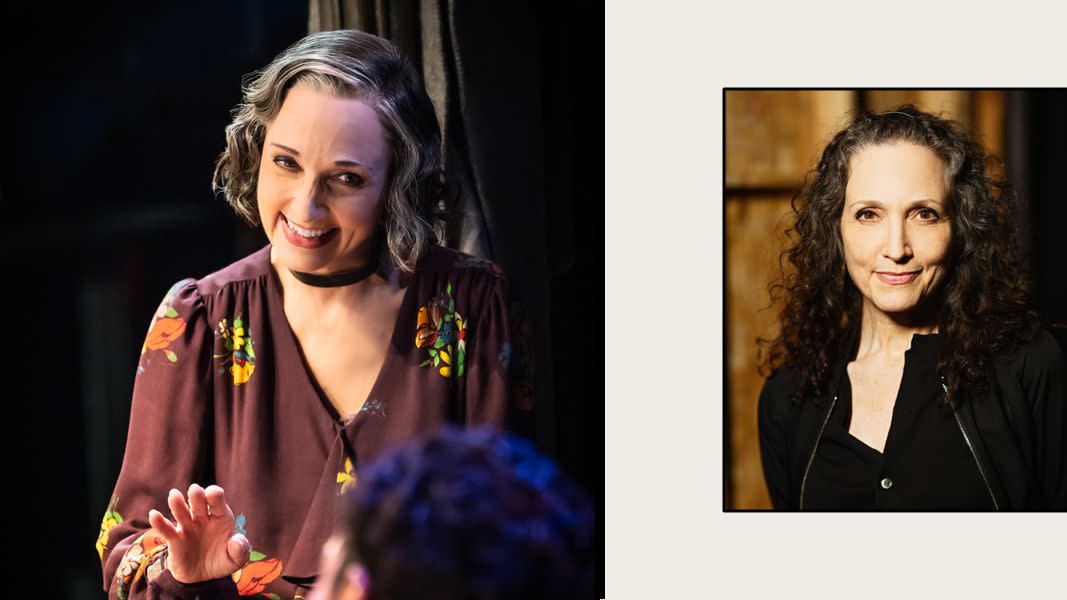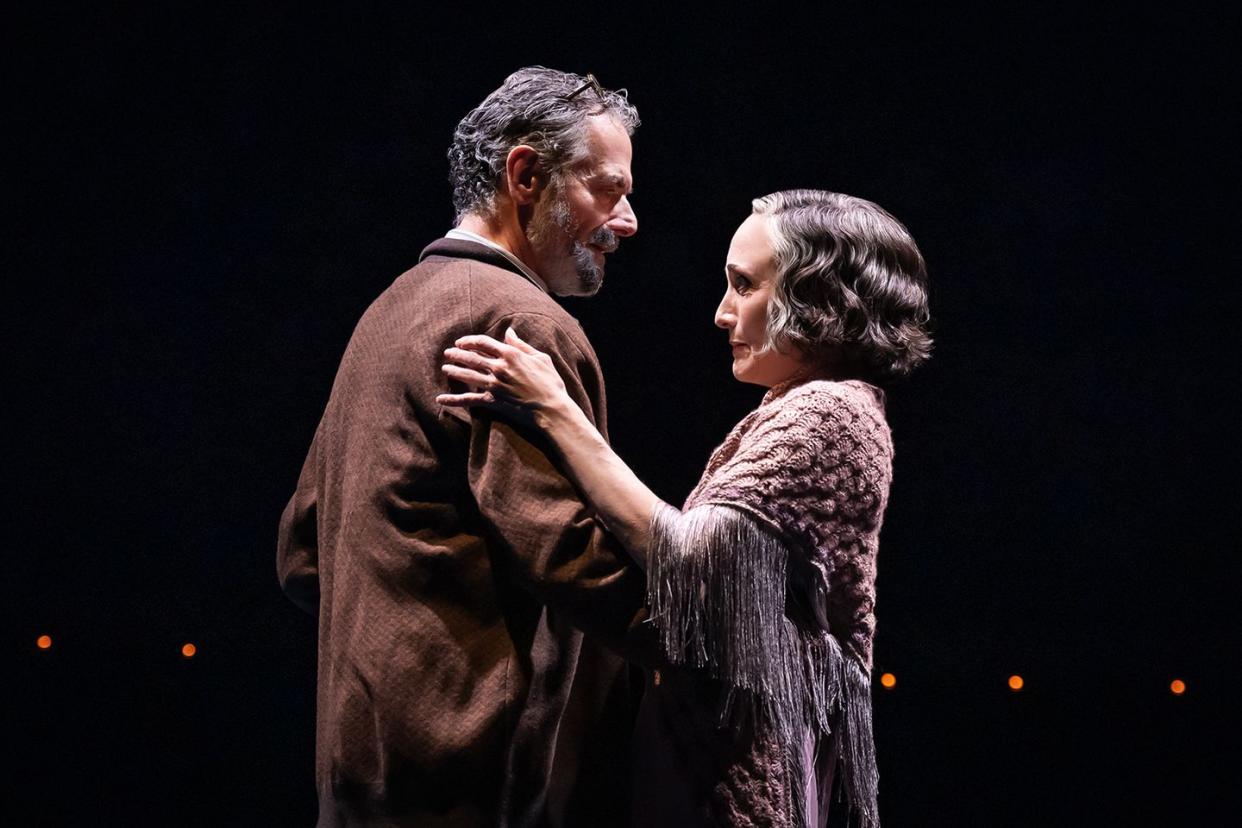Bebe Neuwirth Believes in Storytelling


Places, please for ELLE’s column Showstoppers, where theater’s biggest stars reflect upon the moment in their career where the famous phrase “the show must go on” became a little too real. When things don’t go according to plan onstage, here’s how the pros react—and what they take away from it.
This month, Bebe Neuwirth, who stars as Fräulein Schneider in the new revival of Kander and Ebb’s Cabaret at the Kit Kat Club, talks about the importance of theater after the COVID-19 pandemic and the time a bat flew on stage. Here, in her own words, the two-time Tony and two-time Emmy award-winning actress shares how theater can be deeply spiritual and how community is a part of the human experience.
The first thing that came to me was the time a bat flew onto the stage. I mean it was just something you had to get through and ignore what was happening. There are goofy things.
But, when the world shut down because of COVID-19, we were all robbed of the communal experience. There was a real need to gather again in theaters and experience shows, tell stories, and hear stories, because I believe that it is a primal drive in humans. That is part of our human experience that is ancient. It’s who we are. We gather in our tribe and together we sit by the tribal fire. We sing stories, and we dance to stories, and we dance together, or we participate in some way, whether you’re the storyteller by the fire dancing or you are on the outside banging your hands on the dirt and listening. We are all participating together as a community, and I really believe that’s a primal thing we have. I don’t think that we’re necessarily conscious of it.
It was chipping away at us in many different ways. I believe very strongly that this was one of the aspects that was really hard for the audience, and certainly hard for performing artists, because that’s who we are. That’s how we express. A lot of people tried to make things happen on Zoom. I participated in a lot of it. I was very grateful for it, but there was also something deeply sad about it, because we weren’t by the footlights, our modern day tribal fire.
I certainly feel that the theater can be deeply spiritual. There is a nobility of the entire company coming together. People get injured in shows, especially dance shows, and I’ve seen people limp off stage or pull themselves off stage, and then understudy or swing hurries up and gets into costume. I’ve been thrown on in the middle of shows. I’ve been in shows where they’ve brought the curtain in and asked for a doctor in the house.
I can’t tell you how quickly people and crews and stage management moves when somebody goes down and doctors are called. The things that happen backstage are really remarkable. There’s also that feeling of the company rallying to support that person, but rallying to support the show and the audience. The audience is the other partner. It’s a rehearsal until the audience is there. We are all together. We have to continue to make this event happen and carry on, and do the very best we can as if nothing happened. It can be very difficult because we might love the person who has fallen ill or hurt themselves. It can reinforce how much we love what we do, how fragile existence is, how fragile the show itself is. It just really galvanizes a company and focuses. It’s a humble nobility. Doing the right thing for the good of the whole, of the group.

Talkback
On why she’s excited about this production of Cabaret:
“I’d only seen the show a couple times a long time ago. Manhattan School of Music did a production of it. It was in 2019. The young woman playing Fräulein Schneider, [Laura Zimmer], she must’ve been at most 21 or something, was so good. I thought, gee whiz! That’s the part.
“I’ve been on stage since I was a very little girl, and I’m more comfortable there than anywhere. So, when my agent said, ‘You want to go and meet this director and audition for this production of Cabaret? It’s a really big deal in London, and it’s really great production.’ I said, ‘Absolutely, sure.’
“When the audition came around, as soon as I met with Rebecca [Frecknall, the director], I just wanted to stay and listen to her talk and talk about musical theater all afternoon. Then they asked me to come back and sing. I’m thrilled to have the part.”
On the relationship between Herr Schultz and Fräulein Schneider:
“It is a real blessing to have Steven Skybell as my acting partner. I think he’s a magnificent actor. I’ve worked with him before [in Classic Stage Company’s A Midsummer Night’s Dream] and loved working with him, and it was so grateful to me that those are the eyes I’m looking into. As a 65-year-old woman, I’m very pleased to have a loving, physical, romantic relationship portrayed on a stage in a way that’s not, ‘Oh, aren’t they cute?’ That might be a rare thing and I’m very grateful for that.”
On how Cabaret and Fräulein Schneider’s story are so relevant:
“Antisemitism is ancient and it’s never gone away. More people are aware of it now, more people are signing up for it, and more people are being loud about it, but that’s a constant.
“I feel a great responsibility with the part to make sure that this central question of ‘What would you do?’ in [Fräulein Schneider’s situation] is given as much fodder as possible. It’s a very complicated, difficult, awful decision that Fräulein Schneider has to make, and she does not make it without deep shame and guilt and self-loathing and also self-justification. It’s really complicated. That’s the last thing she does on the stage, is pose that question. She’s fun, she’s gregarious, she’s a really sharp businesswoman. She’s strong, she’s tough, she’s all these things. She’s kind, she’s a little bit goofy. She likes the Bohemians. I hope to make her a very full and complicated person who can hold a lot of different qualities at the same time, so that when her final moment on the stage [comes], we get a full person. If you take that song, ‘What Would You Do?’ out of context, it loses a bit of something. You have to see how much she absolutely adores, loves, cares so deeply, and who Herr Schultz is to her.
“We have to have enough information so that we can approach that question. In a way, it’s the simplest of questions and in a way, it’s the most complicated questions, because right now in our country and around the world, this is a question that is relevant.”
On working on a John Kander and Fred Ebb show, after starring many times in their musical Chicago:
“I love their music. I love John’s music. I love Fred’s lyrics. The alchemy of that music and those lyrics, they create a world with the seemingly simplest of songs that are profound and deep and hold altitudes. That is very appealing. I can feel the influence of Kurt Weill on them. I’m a big Kurt Weill fan. I just feel like he’s in the ancestry. He’s part of where they have come from. That music makes me want to dance, it makes me want to wiggle. They make me cry, they make me laugh. Their songs are so satisfying. They satisfy the wit and the humor and the heart, the duality of life. They have darkness and light in all of their songs.”
On Debbie Allen in Sweet Charity:
“I learned about leading a company from Debbie Allen. She played Charity in Sweet Charity. I don’t know of a harder role and more taxing role in musical theater. She was so strong. Eight shows a week and they were all at 100 percent. She was available and open and there and in support of every single person in the company while she was doing her job. She made no demands that we were aware of, she was just doing her job 100 percent, eight times a week. I think that is a great leading person. That’s the job, that’s the deal.”
Her advice for young Broadway performers:
“I’m sure they don’t need my advice. I’m sure they’re doing fine on their own, but if I were to say something, I would just say enjoy it and embrace it. Be in the moment as much as you can, work hard, have fun. I always say to be true to yourself. Find your own voice and how you yourself express that. Make sure that you are not trying to be anybody else, because your own artistry is the most beautiful thing. Trust that you are in the right place at the right time. I think that’s for everybody, whether they’re performing artists or not. It’s all about finding your authentic self and being true to it.”
This interview has been edited and condensed for clarity.
Bebe Neuwirth currently stars as Fräulein Schneider in Cabaret at the Kit Kat Club at the August Wilson Theatre. Tickets can be purchased here.
You Might Also Like
